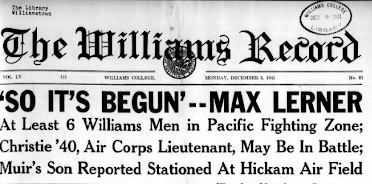Historical Ephvents: Faculty, students, Record editorial board respond to the early months of World War II
March 8, 2023

Since its founding in 1887, the Record has reported on events of local and international significance. The Record column Historical Ephvents explores the paper’s coverage of historical events and their effects on campus. This week, it details the early years of World War II and the attack on Pearl Harbor.
In the early months of World War II, conflict in Europe had only subtle effects on life at the College. “Remote Williamstown suffered its first loss resulting from the contemporary European war,” the Record reported in an Oct. 31, 1939, article, as Myra Hess, a famous English concert pianist, had to postpone a concert at the College due to the conflict.
The new international conflict prompted the Record editorial board to reflect on the campus response to World War I in a November 1940 issue. “[The initial campus response] was one of ignorance of the implications that the war might conceivably have, coupled with amusement at certain phases of it,” the board wrote.
In a Nov. 11, 1939, article, the Record editorial board responded to the cynical attitude toward the 1918 armistice, which signaled the end of World War I. “The Williams undergraduate should find in his education — particularly in his study of history — a perspective that refutes the pessimist,” the board wrote.
The editorial board — writing just two months after Germany’s invasion of Poland in 1939 — argued for a rededication of Veterans Day to support the cause of peace and democracy. “There is greater opportunity than ever before for Williams men, for men throughout the world who are devoted to tolerance and freedom, to strive for the practical realization of those ideals many men thought they were fighting and dying for in the first World War,” the board wrote.
The 20th anniversary of the 1918 armistice increased campus awareness of the European conflict. Students and faculty gathered for a unity rally in Chapin Hall on the 22nd anniversary, where the lessons of 1918 were applied to the “even more dangerous world situation,” according to a Nov. 12, 1940, article.
On the same front page, the Record covered the Selective Service System’s new questionnaires, which students at the College were to return to the Williamstown Draft Board within five days of receipt. A Sept. 16, 1941, article explained that over 20 students left the College for military service at the start of the 1941 academic year — through volunteer positions and the draft — including three Record editorial board members.
Faculty members also shared their opinions on how involved the College community — and the nation — should be in the emerging conflict. An Oct. 21, 1939, article covered an event at Chapin Hall where faculty and then-President of the College James Phinney Baxter III, Class of 1914, denounced the United States’ neutrality legislation, arguing that the American arms embargo supported aggressor nations. “[The speakers agreed that] the United States must abandon an isolationist view toward Europe and consider the war as a situation in which she is forced to decide whether to help build a foundation for future democracy or to give into the forces of fascism,” the article described.
The war eventually began to impact day-to-day campus life, despite the College’s rural location. The Williamstown Committee on Public Safety began to host defense courses open to town residents and undergraduates, the Record reported in an Oct. 6, 1941, article. That same week, the Record announced that U.S. Army bombers were to attack the College in a “trial air raid” by mock German forces the following week. The test to prepare defense precautions — one of several across 10 northeastern states, the Record reported on Oct. 10, 1941 — had no severe consequences.
In fact, an Oct. 17, 1941, article reported that the only damage was a broken window in Jesup Hall, where defense forces found and extinguished an “incendiary bomb” consisting of ignited phosphorus and an electric fan. Students expressed frustration at the lack of danger, bringing their own firecrackers to simulate a realistic air raid, the Record wrote.
On the eve of the American entry into World War II the College was far more aware of the impending conflict than it had been for World War I in 1917. On Dec. 7, 1941, the Imperial Japanese Naval Air Service attacked Pearl Harbor, and the following day, the Record reported on the bombing. “It was learned that twenty Williamstown boys and at least six Williams graduates were stationed in the fighting area,” the Record wrote.
With war confirmed on the horizon, the Record reported that one student was confident, saying, “‘We’ll clean them in six weeks!’” But across campus, students and faculty at large were uncertain of how the following days would proceed, with Williams leadership being eerily cognizant of the tangible effects of a global war in 1917.
In particular there was a debate about whether students should join the military immediately. Baxter, who also served as an intelligence analyst in Washington, D.C., cautioned students against leaving the College to join the U.S. military. On Dec. 12, 1941, the Record editorial board encouraged students to help win the war from the College. “With a real feeling of the privileges that are ours, we should adopt immediately a broad program of savings in our fraternities and in our personal living,” the board wrote. “Even before we join the armed forces, we as college undergraduates can help win this war.”







